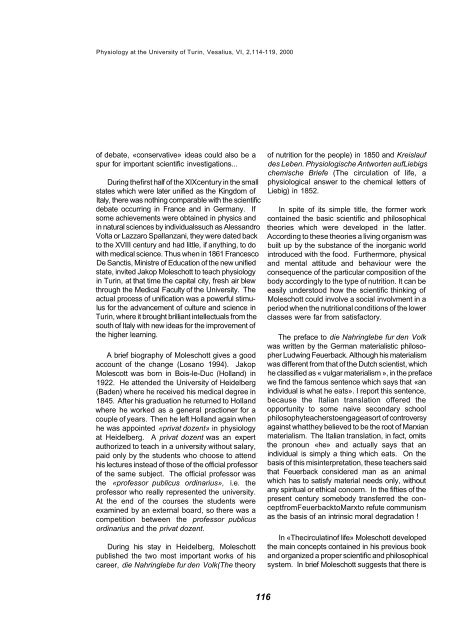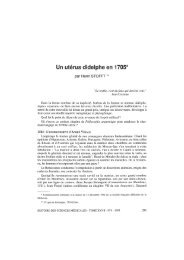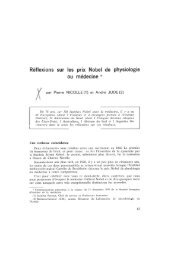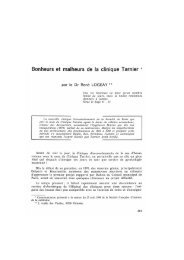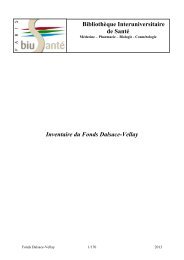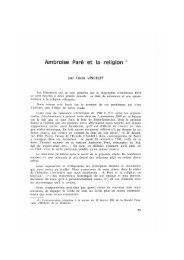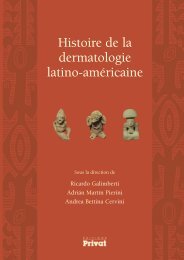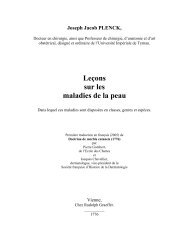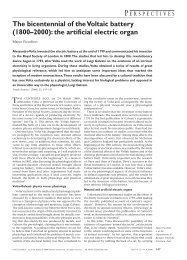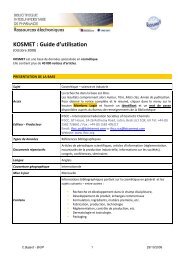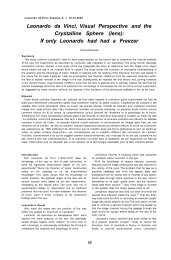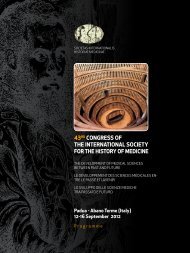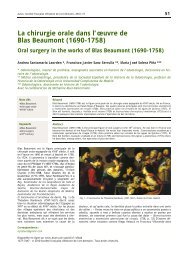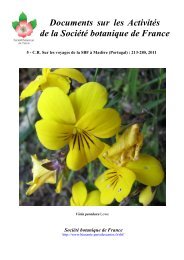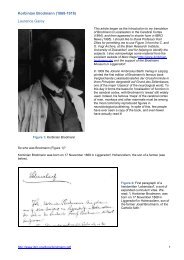Physiology at <strong>the</strong> University <strong>of</strong> Turin, Vesalius, VI, 2,114-119, 2000The characteristics <strong>of</strong> <strong>the</strong> ruling c<strong>la</strong>ss were ina way <strong>the</strong> characteristics <strong>of</strong> culture in Torino :progressive enough to press <strong>the</strong> Governmenttowards liberal reforms, <strong>the</strong> world <strong>of</strong> culture hadnot yet absorbed <strong>the</strong> new scientific spirit which inFrance, in Eng<strong>la</strong>nd and <strong>la</strong>ter in Germany had itsroots in positivistic philosophy.Positivistic philosophy, however, was notunknown in italy. Here it had its main representativein Roberto Ardigo (1828-1920), a former priest, who<strong>de</strong>voted himself to <strong>the</strong> scientific renewal <strong>of</strong>psychology. Italian positivism had quite differentcharacteristics compared with French positivism: inFrance it was popu<strong>la</strong>r amongst <strong>the</strong> scientificcommunity and <strong>the</strong> ruling c<strong>la</strong>ss, whereas in Italy itwas a minority trend. In Torino, just a few yearsbefore <strong>the</strong> unification <strong>of</strong> Italy, a new wind blew with<strong>the</strong> arrival from Naples <strong>of</strong> some Hegelian «eggheads»who, in <strong>the</strong>ir opposition to <strong>the</strong> Bourbonicregime had e<strong>la</strong>borated innovative political and culturalways <strong>of</strong>thinking. BertrandoSpaventa, SalvatoreTommasi and Francesco De Sanctis contributed to<strong>the</strong> updating <strong>of</strong> culture and, indirectly, <strong>of</strong> science in<strong>the</strong> ra<strong>the</strong>r conservative, educated upper c<strong>la</strong>sses <strong>of</strong>Torino. In particu<strong>la</strong>r De Sanctis, who becameMinister <strong>of</strong> Education after <strong>the</strong> unification <strong>of</strong> Italy,was <strong>the</strong> man who invited <strong>the</strong> Dutch scientist JakopMoleschott from Zurich to teach Physiology at <strong>the</strong>University <strong>of</strong> Torino. The arrival <strong>of</strong> Moleschott inTorino represented a real turning point in <strong>the</strong> field <strong>of</strong>physiological research in this university.The different political, cultural and philosophicalbackground <strong>of</strong> France and Italy involved a differencealso in <strong>the</strong> advancement <strong>of</strong> biological sciences. InFrance, research in Physiology was stimu<strong>la</strong>ted bypositivism, in spite <strong>of</strong> some curious extremistaspects <strong>of</strong> this philosophical trend, such as <strong>the</strong>religion <strong>of</strong> Humanity <strong>of</strong> Auguste Comte. In Italy itwas still in a sort <strong>of</strong> pre-scientific stage.For a better un<strong>de</strong>rstanding <strong>of</strong> <strong>the</strong> «birth» <strong>of</strong>mo<strong>de</strong>m physiology in Europe a number <strong>of</strong> factorsmust be consi<strong>de</strong>red. While <strong>the</strong> term «physiology»was at first a name given to any attemps to exp<strong>la</strong>invital and behavioural processes in a materialisticway, such attempts soon showed <strong>the</strong> strict<strong>de</strong>pen<strong>de</strong>nce <strong>of</strong> <strong>the</strong> new science on anatomy.Anatomy, however, could not supply enough informationto exp<strong>la</strong>in <strong>the</strong> phenomena occurring in livingorganisms. The Elementa physiologiae corporishumani, published by Albrecht von Haller between1757 and 1766 was an example <strong>of</strong> <strong>the</strong> limits <strong>of</strong> <strong>the</strong><strong>de</strong>pen<strong>de</strong>nce <strong>of</strong> physiology on anatomy. It was clearthat physiology had to look for its roots elsewhere.Thus<strong>the</strong> attention <strong>of</strong> physiologists turned to chemistryand physics. The separation <strong>of</strong> physiology fromanatomy, i.e. <strong>of</strong> function from structure, p<strong>la</strong>yed aremarkable role in <strong>the</strong> success <strong>of</strong> what becameknown as vitalism. A good exemple <strong>of</strong> vitalism is tobe found in a book published by Xavier Bichat in1800 with <strong>the</strong> meaningful title <strong>of</strong> Recherches physiologiquessur <strong>la</strong> vie et <strong>la</strong> mort. However vitalismwas not always an impediment to research if itencouraged <strong>the</strong> activity and <strong>the</strong> achievements <strong>of</strong>men like Bichat and Francois Magendie, who wasat <strong>the</strong> same time both vitalist and uphol<strong>de</strong>r <strong>of</strong> <strong>the</strong>necessity <strong>of</strong> experimental investigations. In oppositionto vitalism, which asserted <strong>the</strong> existence <strong>of</strong> avital force at <strong>the</strong> origin <strong>of</strong> all vital processes,mechanicalism consi<strong>de</strong>red <strong>the</strong>se processes as <strong>the</strong>result <strong>of</strong> two components only : matter andmovement. In France mechanicalism in sciencewas obviously strictly combined with positivism inphilosophy.In Germany <strong>the</strong> situation was ra<strong>the</strong>r different,because <strong>of</strong> <strong>the</strong> heritage <strong>of</strong> <strong>the</strong> movement <strong>of</strong>Naturphilosophie. This movement, thoughproducing interesting results in different fields <strong>of</strong>culture and literature, was <strong>the</strong> source <strong>of</strong> someprejudice which caused a <strong>de</strong><strong>la</strong>y in <strong>the</strong> revival <strong>of</strong>science. In opposition to Naturphilosophie, <strong>the</strong>new i<strong>de</strong>as raised by positivism <strong>de</strong>veloped into areal philosophical materialism in <strong>the</strong> thinking <strong>of</strong>scientist such as Karl Vogt, Ludwig Buchner andJakop Moleschott. It is important to remember,however, that in Germany vitalism was also astimulus for a number <strong>of</strong> scientists: <strong>the</strong> names and<strong>the</strong> results <strong>of</strong> Johannes Muller and Justus Liebigare remarkable examples <strong>of</strong> how, in <strong>the</strong> presence115
Physiology at <strong>the</strong> University <strong>of</strong> Turin, Vesalius, VI, 2,114-119, 2000<strong>of</strong> <strong>de</strong>bate, «conservative» i<strong>de</strong>as could also be aspur for important scientific investigations...During <strong>the</strong>first half <strong>of</strong> <strong>the</strong> XlXcentury in <strong>the</strong> smallstates which were <strong>la</strong>ter unified as <strong>the</strong> Kingdom <strong>of</strong>Italy, <strong>the</strong>re was nothing comparable with <strong>the</strong> scientific<strong>de</strong>bate occurring in France and in Germany. Ifsome achievements were obtained in physics andin natural sciences by individualssuch as AlessandroVolta or Lazzaro Spal<strong>la</strong>nzani, <strong>the</strong>y were dated backto <strong>the</strong> XVIII century and had little, if anything, to dowith medical science. Thus when in 1861 FrancescoDe Sanctis, Ministre <strong>of</strong> Education <strong>of</strong> <strong>the</strong> new unifiedstate, invited Jakop Moleschott to teach physiologyin Turin, at that time <strong>the</strong> capital city, fresh air blewthrough <strong>the</strong> Medical Faculty <strong>of</strong> <strong>the</strong> University. Theactual process <strong>of</strong> unification was a powerful stimulusfor <strong>the</strong> advancement <strong>of</strong> culture and science inTurin, where it brought brilliant intellectuals from <strong>the</strong>south <strong>of</strong> Italy with new i<strong>de</strong>as for <strong>the</strong> improvement <strong>of</strong><strong>the</strong> higher learning.A brief biography <strong>of</strong> Moleschott gives a goodaccount <strong>of</strong> <strong>the</strong> change (Losano 1994). JakopMolescott was born in Bois-le-Duc (Hol<strong>la</strong>nd) in1922. He atten<strong>de</strong>d <strong>the</strong> University <strong>of</strong> Hei<strong>de</strong>lberg(Ba<strong>de</strong>n) where he received his medical <strong>de</strong>gree in1845. After his graduation he returned to Hol<strong>la</strong>ndwhere he worked as a general practioner for acouple <strong>of</strong> years. Then he left Hol<strong>la</strong>nd again whenhe was appointed «privat dozent» in physiologyat Hei<strong>de</strong>lberg. A privat dozent was an expertauthorized to teach in a university without sa<strong>la</strong>ry,paid only by <strong>the</strong> stu<strong>de</strong>nts who choose to attendhis lectures instead <strong>of</strong> those <strong>of</strong> <strong>the</strong> <strong>of</strong>ficial pr<strong>of</strong>essor<strong>of</strong> <strong>the</strong> same subject. The <strong>of</strong>ficial pr<strong>of</strong>essor was<strong>the</strong> «pr<strong>of</strong>essor publicus ordinarius», i.e. <strong>the</strong>pr<strong>of</strong>essor who really represented <strong>the</strong> university.At <strong>the</strong> end <strong>of</strong> <strong>the</strong> courses <strong>the</strong> stu<strong>de</strong>nts wereexamined by an external board, so <strong>the</strong>re was acompetition between <strong>the</strong> pr<strong>of</strong>essor publicusordinarius and <strong>the</strong> privat dozent.During his stay in Hei<strong>de</strong>lberg, Moleschottpublished <strong>the</strong> two most important works <strong>of</strong> hiscareer, die Nahringlebe fur <strong>de</strong>n Volk(The <strong>the</strong>ory<strong>of</strong> nutrition for <strong>the</strong> people) in 1850 and Kreis<strong>la</strong>uf<strong>de</strong>s Leben. Physiologische Antworten aufLiebigschemische Briefe (The circu<strong>la</strong>tion <strong>of</strong> life, aphysiological answer to <strong>the</strong> chemical letters <strong>of</strong>Liebig) in 1852.In spite <strong>of</strong> its simple title, <strong>the</strong> former workcontained <strong>the</strong> basic scientific and philosophical<strong>the</strong>ories which were <strong>de</strong>veloped in <strong>the</strong> <strong>la</strong>tter.According to <strong>the</strong>se <strong>the</strong>ories a living organism wasbuilt up by <strong>the</strong> substance <strong>of</strong> <strong>the</strong> inorganic worldintroduced with <strong>the</strong> food. Fur<strong>the</strong>rmore, physica<strong>la</strong>nd mental attitu<strong>de</strong> and behaviour were <strong>the</strong>consequence <strong>of</strong> <strong>the</strong> particu<strong>la</strong>r composition <strong>of</strong> <strong>the</strong>body accordingly to <strong>the</strong> type <strong>of</strong> nutrition. It can beeasily un<strong>de</strong>rstood how <strong>the</strong> scientific thinking <strong>of</strong>Moleschott could involve a social involvment in aperiod when <strong>the</strong> nutritional conditions <strong>of</strong> <strong>the</strong> lowerc<strong>la</strong>sses were far from satisfactory.The preface to die Nahringlebe fur <strong>de</strong>n Volkwas written by <strong>the</strong> German materialistic philosopherLudwing Feuerback. Although his materialismwas different from that <strong>of</strong> <strong>the</strong> Dutch scientist, whichhe c<strong>la</strong>ssified as « vulgar materialism », in <strong>the</strong> prefacewe find <strong>the</strong> famous sentence which says that «anindividual is what he eats». I report this sentence,because <strong>the</strong> Italian trans<strong>la</strong>tion <strong>of</strong>fered <strong>the</strong>opportunity to some naive secondary schoolphilosophyteacherstoengageasort <strong>of</strong> controversyagainst what<strong>the</strong>y believed to be <strong>the</strong> root <strong>of</strong> Marxianmaterialism. The Italian trans<strong>la</strong>tion, in fact, omits<strong>the</strong> pronoun «he» and actually says that anindividual is simply a thing which eats. On <strong>the</strong>basis <strong>of</strong> this misinterpretation, <strong>the</strong>se teachers saidthat Feuerback consi<strong>de</strong>red man as an animalwhich has to satisfy material needs only, withoutany spiritual or ethical concern. In <strong>the</strong> fifties <strong>of</strong> <strong>the</strong>present century somebody transferred <strong>the</strong> conceptfromFeuerbacktoMarxtorefute communismas <strong>the</strong> basis <strong>of</strong> an intrinsic moral <strong>de</strong>gradation !In «Thecircu<strong>la</strong>tin<strong>of</strong> life» Moleschott <strong>de</strong>veloped<strong>the</strong> main concepts contained in his previous bookand organized a proper scientific and philosophicalsystem. In brief Moleschott suggests that <strong>the</strong>re is116
- Page 1 and 2: Official journal of the Internation
- Page 3 and 4: Editorial, Vesalius, VI, 2, 82, 200
- Page 5 and 6: M. Aleman and J. Locke, two frustra
- Page 7 and 8: M. Aleman and J. Locke, two frustra
- Page 9 and 10: M. Aleman and J. Locke, two frustra
- Page 11 and 12: J.J. Virey et la naissance de la ch
- Page 13 and 14: J.J. Virey et la naissance de la ch
- Page 15 and 16: J.J. Virey et la naissance de la ch
- Page 17 and 18: J.J. Virey et la naissance de la ch
- Page 19 and 20: J.J. Virey et la naissance de la ch
- Page 21 and 22: Oriental medical manuscripts in Uzb
- Page 23 and 24: Oriental medical manuscripts in Uzb
- Page 25 and 26: Oriental medical manuscripts in Uzb
- Page 27 and 28: M.-A. Paulze, épouse et collaborat
- Page 29 and 30: M.-A. Paulze, épouse et collaborat
- Page 31 and 32: M.-A. Paulze, épouse et collaborat
- Page 33 and 34: M.-A. Paulze, épouse et collaborat
- Page 35: Physiology at the University of Tur
- Page 39 and 40: Physiology at the University of Tur
- Page 41 and 42: La collection Léo-Errol Pariseau,
- Page 43 and 44: La collection Léo-Errol Pariseau,
- Page 45 and 46: La collection Léo-Errol Pariseau,
- Page 47 and 48: La collection Hiram Winnet Orr, Ves
- Page 49 and 50: La collection Hiram Winnet Orr, Ves
- Page 51 and 52: Vesalius, VI, 2, 130-132, 2000Place
- Page 53 and 54: Vesalius, VI, 2, 130-132, 2000The b
- Page 55 and 56: Vesalius, VI, 2, 133-135, 2000Finan
- Page 57 and 58: Vesalius, VI, 2, 136-150, 2000Compt
- Page 59 and 60: Vesalius, VI, 2, 136-150, 2000chang
- Page 61 and 62: Vesalius, VI, 2, 136-150, 2000Il y
- Page 63 and 64: Vesalius, VI, 2, 136-150, 20006. Ra
- Page 65 and 66: Vesalius, VI, 2, 136-150, 2000les c
- Page 67 and 68: Vesalius, VI, 2, 136-150, 2000Grèc
- Page 69 and 70: Vesalius, VI, 2, 136-150, 2000et l'
- Page 71 and 72: Vesalius, VI, 2, 136-150, 2000Disco
- Page 73 and 74: Vesalius, VI, 2, 151-154, 2000unive
- Page 75 and 76: Vesalius, VI, 2,151-154, 2000Sleim
- Page 77 and 78: Vesalius, VI, 2, 156, 2000Informati
- Page 79 and 80: Vesalius, VI, 2,157-159, 20008-14 J
- Page 81 and 82: Vesalius, VI, 2,160, 2000Applicatio


